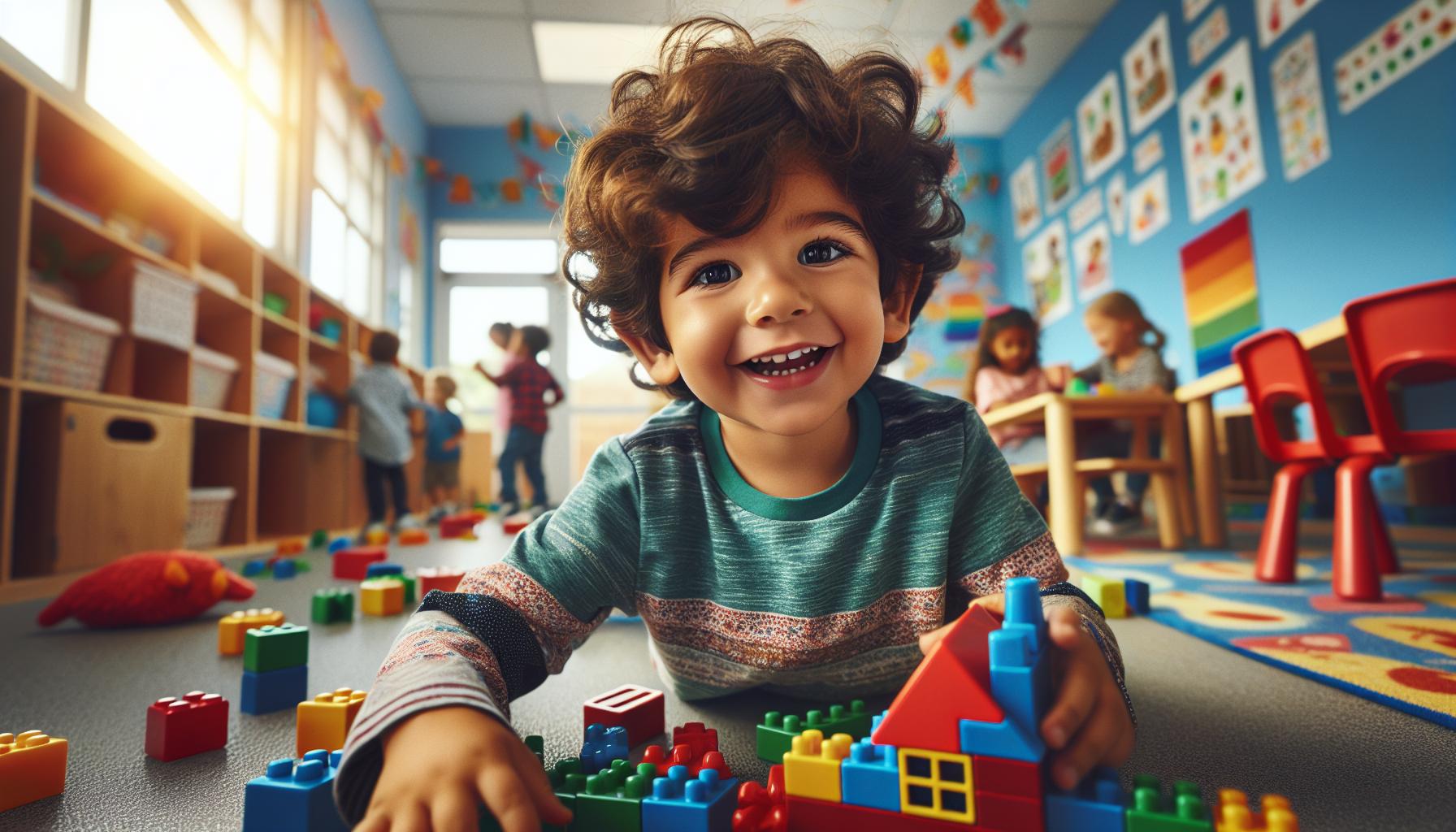Choosing the right preschool for your 3-year-old can feel overwhelming, but it’s a crucial step in their early development. At this age, kids are like little sponges, ready to soak up new experiences and knowledge. Finding a nurturing environment that fosters their curiosity and creativity is essential for laying a solid foundation for future learning.
I’ve explored various options and discovered that preschool isn’t just about academics; it’s also about socialization and emotional growth. Your child will learn to interact with peers, develop independence, and build confidence in a structured yet playful setting. In this article, I’ll share insights and tips to help you navigate the preschool landscape, ensuring your little one gets the best start possible.
Key Takeaways
- Foundational Development: Preschool for 3-year-olds lays a critical foundation for cognitive, social, and emotional growth that impacts future learning.
- Cognitive Skills: Early education introduces key concepts like numbers and letters, stimulating curiosity and boosting early literacy and numeracy skills.
- Social Interaction: Interaction with peers in preschool enhances crucial social skills such as sharing, cooperation, and conflict resolution.
- Emotional Regulation: A nurturing preschool environment helps children express themselves and develop emotional resilience and independence.
- Choosing Wisely: When selecting a preschool, consider location, curriculum, teacher qualifications, safety measures, and opportunities for parental involvement.
- Program Variations: Familiarize yourself with different preschool programs, like play-based learning and the Montessori approach, to find the best fit for your child’s needs.
Preschool For 3 Year Old
Preschool for 3-year-olds serves as a foundational stepping stone in a child’s development. Early education significantly impacts cognitive, social, and emotional growth. It offers a structured environment where children explore, learn, and play. Here are key benefits of preschool for this age group:
- Cognitive Development: Preschool introduces fundamental concepts such as numbers, letters, and shapes. Engaging activities stimulate curiosity, promoting early literacy and numeracy skills.
- Social Skills: Interaction with peers encourages sharing, turn-taking, and cooperation. Children learn to navigate friendships, resolve conflicts, and develop empathy.
- Emotional Growth: A nurturing environment fosters self-expression and emotional regulation. Children gain confidence as they engage in various activities and receive positive reinforcement.
- Independence: Preschool promotes self-reliance through routines and activities. Children practice making choices, following directions, and taking responsibility for their belongings.
- Creativity and Imagination: Creative play and hands-on activities allow children to express themselves. Art, music, and imaginative play stimulate creativity and critical thinking skills.
- Preparation for Future Learning: Early exposure to structured learning experiences sets the stage for a successful transition to kindergarten and formal education.
Preschool not only cultivates essential skills but also ignites a lifelong love for learning, establishing a strong foundation for a child’s academic journey.
Key Benefits Of Early Education
 Early education significantly aids a child’s development by laying a strong foundation for lifelong learning. The benefits span cognitive, social, and emotional growth, all crucial at this formative stage.
Early education significantly aids a child’s development by laying a strong foundation for lifelong learning. The benefits span cognitive, social, and emotional growth, all crucial at this formative stage.
Cognitive Development
Cognitive development in preschool involves exposure to essential concepts such as numbers and letters. Activities like counting games and alphabet songs boost memory recall and understanding. Hands-on experiences, such as sorting objects and matching shapes, nurture problem-solving skills. Research shows that children who engage in structured learning during these early years often demonstrate enhanced intellectual abilities as they progress through school.
Social Skills Enhancement
Social skills enhancement manifests through interactions with peers in a preschool setting. Children learn crucial skills like sharing, taking turns, and effective communication. Group activities, such as circle time and team games, foster collaboration and conflict resolution. Studies indicate that early exposure to social settings boosts self-esteem and encourages positive relationships. Engaging with classmates prepares children for future cooperative learning experiences in school and beyond.
Choosing The Right Preschool![]()
Selecting the ideal preschool is crucial for my child’s development. Several factors and questions guide this important decision.
Factors To Consider
- Location: Proximity to home affects convenience for daily drop-offs and pick-ups.
- Curriculum: A balanced curriculum with a mix of play and academics supports overall growth.
- Teacher Qualifications: Trained educators foster a nurturing environment and facilitate learning.
- Class Size: Smaller class sizes allow for individualized attention and stronger relationships.
- Safety Measures: Secure facilities and clear safety protocols ensure children’s physical well-being.
- Parent Involvement: Opportunities for engagement enhance the connection between home and school.
- Diversity: A diverse environment enriches social experiences and teaches cultural awareness.
- What is the teacher-to-student ratio?: Understanding this helps assess individual attention.
- What is the school’s educational philosophy?: Knowing whether the approach aligns with my values is vital.
- How do you handle discipline?: Policies should promote positive behavior and emotional growth.
- What types of activities are included?: Inquiry into daily activities reveals the balance between learning and play.
- Are meals provided?: Nutrition plays a role in my child’s health and readiness to learn.
- What opportunities exist for parental involvement?: Engaging with the preschool community supports a collaborative environment.
- How do you communicate with parents?: Regular updates and best practices in communication foster a strong partnership.
Common Preschool Programs
 Preschools offer various programs tailored to the developmental needs of 3-year-olds. Understanding these programs can aid in selecting the right fit for your child.
Preschools offer various programs tailored to the developmental needs of 3-year-olds. Understanding these programs can aid in selecting the right fit for your child.
Play-Based Learning
Play-based learning emphasizes exploration, discovery, and active participation. In this approach, children engage in structured play activities that promote cognitive, social, and emotional growth. Learning through play includes role-playing, art projects, and sensory experiences. These activities support developmental milestones by encouraging problem-solving, creativity, and collaboration. Research shows that this method enhances essential skills like communication and social interaction, providing a solid foundation for future learning.
Montessori Approach
The Montessori approach prioritizes individualized learning in a prepared environment. It fosters independence and self-directed learning. In Montessori classrooms, children choose their activities, encouraging exploration at their own pace. Materials are designed to be hands-on, promoting sensory and cognitive development. Classes often feature mixed-age groups, allowing younger children to learn from their peers while older children reinforce their knowledge by teaching. Studies indicate that children in Montessori programs often outperform their peers in critical thinking and academic skills, thanks to this tailored learning experience.
Challenges Parents May Face
Navigating preschool options for a 3-year-old presents specific challenges. Parents encounter hurdles during this crucial phase of early development.
- Separation Anxiety: Many 3-year-olds experience difficulty separating from parents. This anxiety can lead to tears during drop-off. Implementing a gradual transition can help ease this process.
- Finding the Right Fit: Identifying a preschool that aligns with a child’s needs is essential. Parents may face challenges in finding a school that offers a nurturing environment, appropriate curriculum, and qualified staff.
- Time Constraints: Busy schedules make it tough for parents to visit multiple preschools. Coordinating tours and interviews can overwhelm parents trying to make an informed decision.
- Cost Considerations: Tuition can vary significantly among preschools. Many parents struggle to balance quality education with their financial situation. Investigating scholarship opportunities or sliding scale programs can alleviate financial pressure.
- Social Development: Parents may worry that their child won’t adapt to a group setting. Observing social interactions and discussing concerns with educators can provide reassurance.
- Balancing Expectations: Parents often have high expectations for preschool. Understanding that each child develops at their own pace helps manage these expectations. Encouraging independence and self-expression is vital.
- Parental Involvement: Some preschools encourage active parental involvement while others maintain a more structured approach. Finding a preschool that aligns with a parent’s desire for involvement can be challenging.
- Communication Gaps: Effective communication between parents and educators is crucial. Parents may find it difficult to establish open lines of communication. Regular check-ins and scheduled meetings can help bridge this gap.
Addressing these challenges proactively can lead to a smoother transition into preschool, supporting both children and parents in this important milestone.
Choosing the right preschool for my 3-year-old is a journey that shapes their early development. I’ve learned that this decision goes beyond academics and touches on social and emotional growth. A nurturing environment can truly ignite a child’s curiosity and creativity.
As I reflect on the benefits of preschool, I see how it lays a strong foundation for lifelong learning. The skills gained through play-based activities and peer interactions are invaluable. It’s essential to consider factors like location, curriculum, and teacher qualifications when making this choice.
Navigating the preschool landscape can be challenging but being proactive and informed helps ease the process. With the right support and resources, I can ensure my child has the best start on their educational journey.

